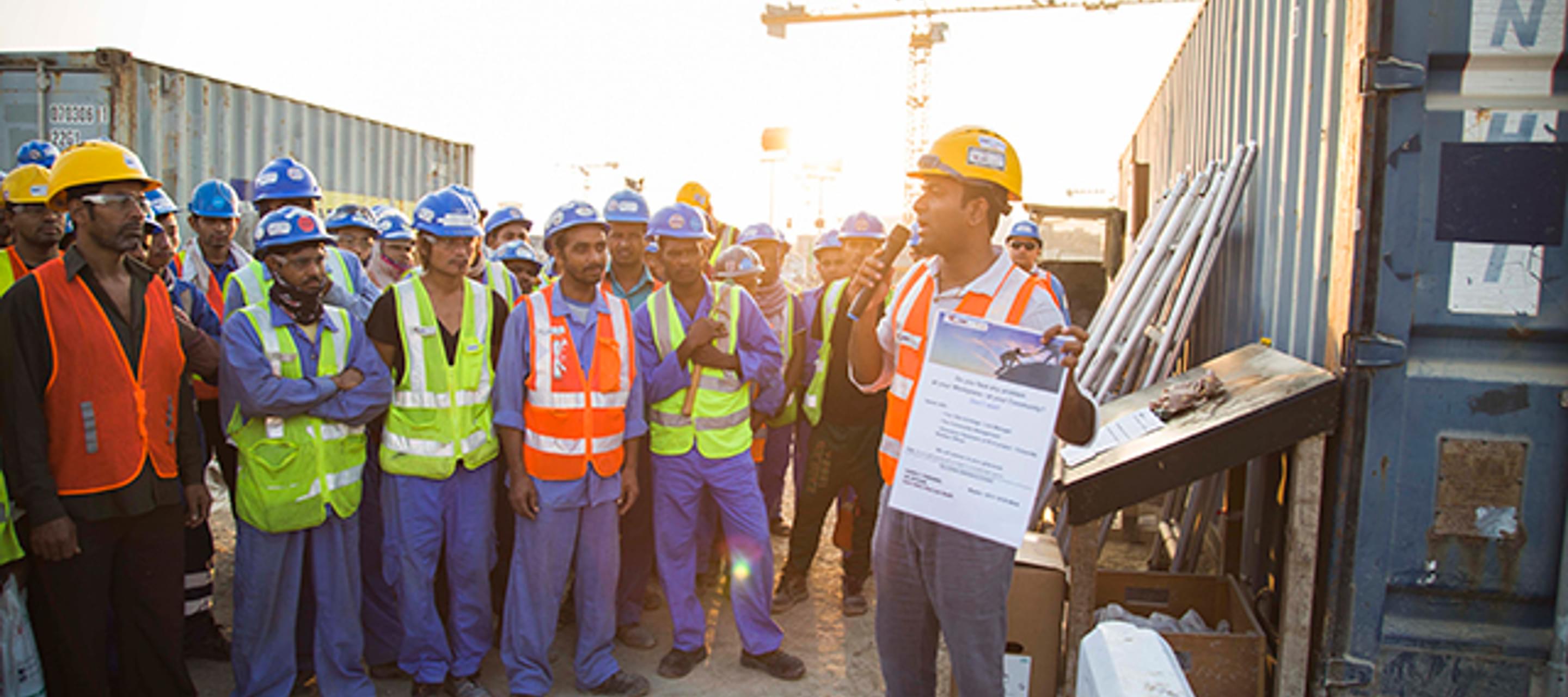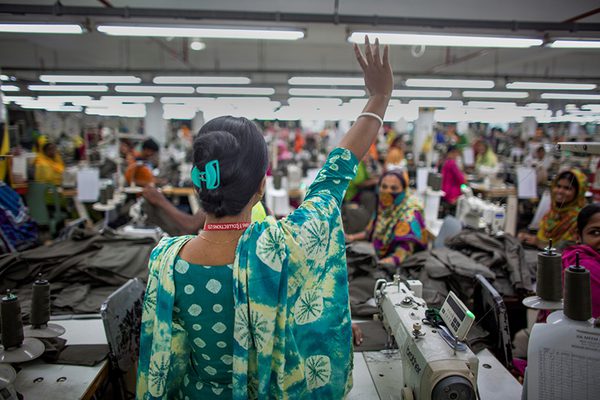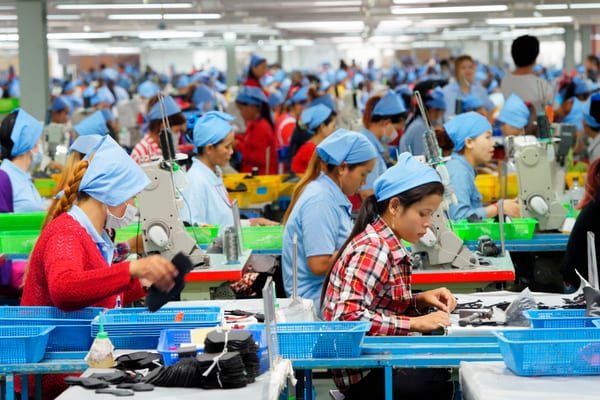Realising Workers’ Rights in Qatar – A Conversation
21 October 2019

Freedom of association and choosing to belong or not belong to a trade union are integral parts of a free society and are fundamental rights. Trade unions can play a vital role in improving health and safety, addressing grievances, and promoting worker well-being.
While the vast majority of countries recognise the right of workers to freedom of association, in some countries workers are still not allowed to exercise this right. Denying workers the right to form or join unions and to collectively bargain makes them more vulnerable to exploitation and abuse. In contexts where trade union membership is restricted, elected worker committees can be an important step in the right direction.
In November 2017, the global union Building and Wood Workers’ International (BWI) signed an agreement with QDVC (a Qatari shareholding company with two shareholders: Qatari Diar and VINCI Construction Grands Projets and VINCI, a French-based global construction company). QDVC undertook elections for Workers’ Welfare Committees in Qatar, a country that does not fully recognise trade union rights.
In this conversation, IHRB’s William Rook explores the groundbreaking process with Jin Sook Lee, BWI’s Global Campaign Director, and Henriette McCool, VINCI’s Social Responsibility manager and former CSR manager at QDVC.
William: Can you describe first of all the framework agreement between BWI, QDVC and VINCI?
Jin Sook: The focus of the agreement is to ensure decent work, safety, health and welfare standards for all workers employed by QDVC in Qatar. The agreement was a result of continuous engagement between BWI and VINCI since 2014 to address the working and living conditions of all workers at QDVC operations. To monitor the implementation of the agreement, the BWI/QDVC/VINCI Reference Group conducted a joint audit of the QDVC sites and operations in Qatar on 8-9 January 2019. The inspection also gave BWI representatives, along with its French affiliates, the opportunity to observe the Workers’ Welfare Committee elections (here is a short film).
William: When we look at the elections QDVC held, what scale are we talking about and how did the process work?
Henriette: Candidates were given two weeks to campaign after which elections were held as per the QDVC Workers’ Welfare Committee procedure. Out of a total population of 1,560 workers, 1,283 attended the awareness campaign and 879 voted (participation rate of 84%). A total of 12 worker representatives were elected from various projects and nationalities. For QDVC, the elections were a way to fulfill the commitment it made in the agreement to establish independent and elected Workers’ Welfare Committees (WWC). QDVC previously organised elections for its WWC in 2016 following recommendations from BWI, but this was the first time BWI was able to observe and assess the election process.
William: What is BWI’s experience of engaging with companies in Qatar?
Jin Sook: Qatar has not yet gone all the way to ensure that fundamental workers’ rights, as defined in ILO Conventions are honoured. However, they have made significant and important progress. That has, in turn, made it possible for companies to develop work that goes further, but is along the same lines. Nothing that we do together with companies contradicts the law and regulations. But we try to make sure that new opportunities provided for in law and in regulations are fully used and explored.
William: What does workers’ voice mean in the context of Qatar?
Jin Sook: Workers’ voice is a vague concept. Sometimes it is taken to mean talking to a few workers, which assumes they are not too afraid to tell the truth. Sometimes, it involves surveys of workers or sending NGOs, civil society groups or firms to do so. The key to real workers’ voice, however, is representation. For that voice to be fully heard, workers need to be able to form their own organisations they control and engage in collective bargaining. The election of worker committees is an important step in that direction. The elections we witnessed were clearly free from company interference and the comments from elected worker representatives show that they are speaking freely. While some concentrate on the negative, BWI has witnessed changes over several years of working on the ground. To us, there is much positive progress. The voice provided by these freely elected committees may not be as strong as it should be, but it is real, not imitation.
William: How did QDVC address the issue of workers’ voice in an environment where trade unions have certain restrictions?
Henriette: Restrictions around freedom of association and collective bargaining for non-nationals did not prevent QDVC from facilitating the organisation of a consultative, and yet strong workers’committee. A small and informal committee has existed since 2011. From 2014, we encouraged our workers to volunteer to be part of project-level committees. We wrote a formal procedure about the rules and role of the Workers’ Welfare Committee to ensure their status was recognized in the company. We also made sure that their foremen and managers were informed and supportive of their participation in committee meetings during working-hours. Finally, we facilitated their effort to organise a campaign to elect their representatives and made sure meetings with management were held regularly and transparently.
William: Could you tell us more about the collaboration with BWI?
Henriette: BWI visited QDVC sites and accommodation in January 2015 and April 2016. It was BWI who recommended to move towards a more representative election-system, which we did in 2016. The elections turned out to be an extremely effective way to make the Workers’ Welfare Committee better known among all employees. It also led to the emergence of skilled representatives, those who were trusted by their co-workers and who had a strong voice. The second election in 2019 was a great way to anchor our practices in the long-term, have them validated by an independent third-party and to continue to get advice from external observers.
William: What were the benefits of this collaboration with an international trade union?
Henriette: Rather than seeing it as a constraint, we saw the workers’ committee and our collaboration with BWI as an opportunity to establish a constructive social dialogue: the committee led to the creation of a channel of communication between the workforce and management, to detect potential issues, solve grievances early-on and create a climate of trust. Our agreement with BWI also provided an independent channel for workers should they want to raise their grievances to a third-party outside the company: BWI. In accordance with the agreement, BWI also helped us develop a workers' capacity-building programme for the representatives, the first of its kind in Qatar. It was delivered successfully in 2018 and will be replicated in October 2019, to include representatives of manpower suppliers and subcontractors in addition to the QDVC newly elected members.
William: What are the next steps?
Jin Sook: The advances with VINCI and QDVC are not over. BWI and the companies are enthusiastic about making the elected committees as effective as possible and I am sure we will have the opportunity and space to do so. Among other things, what we have learned and seen during this cooperation will help us in working with the ILO and the Ministry of Administrative Development, Labor and Social Affairs (ADLASA) to develop and train representatives of joint committees elsewhere in Qatar. We can base further improvements on practical examples of success on the ground and not just theory or experiences from other countries. We are convinced that the more people see the results, the more enthusiastic they will become. Like any change, for governments, companies and trade unions, there is always an element of “fear of the unknown”. With progress and experience, comfort and trust grow, experiments become welcome and further progress follows. We never looked at the agreement and cooperation with VINCI and QDVC as an isolated initiative, but rather as a way to demonstrate what could be done to enhance respect for worker rights and improve standards.




